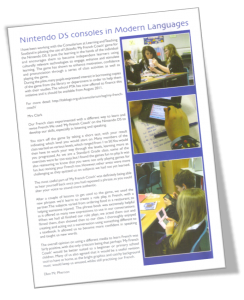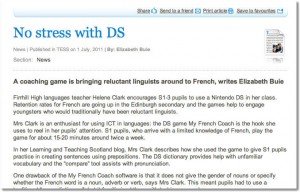

Consolarium blog
 So, it’s the end of the school year and Modern Foreign Language pupils at Firrhill High School in Edinburgh have been reflecting on the use of My French Coach on the Nintendo DS in their French lessons. One of the pupils, wrote about her and her classmates experience of the DS in the school magazine, Firrhill Heights.
So, it’s the end of the school year and Modern Foreign Language pupils at Firrhill High School in Edinburgh have been reflecting on the use of My French Coach on the Nintendo DS in their French lessons. One of the pupils, wrote about her and her classmates experience of the DS in the school magazine, Firrhill Heights.
You can read her article here.
 Helene Clark, the languages teacher who lead the project is delighted with the impact the game has had on her pupils learning and spoke to Elizabeth Buie at the TES about her experience. You can read the article here.
Helene Clark, the languages teacher who lead the project is delighted with the impact the game has had on her pupils learning and spoke to Elizabeth Buie at the TES about her experience. You can read the article here.
As a result of the project, Helene submitted a proposal for funding from the PTA at the school in order to buy language based DS games, and other games the Consolarium have used in the past, to be kept in the school library for pupils to borrow in order to improve their French, or indeed get a taster of a new language. Helene stated:
I managed to purchase 14 games for our school library, as well as 2 DS consoles. The idea is that children will be able to borrow the games as they can borrow books to practice French, German, Spanish and Mandarin at their leisure. I have also purchased a couple of “My Word coach” and “Brain Training” games to show that some games can be used to support literacy and numeracy.
The My French Coach games for the DS have been discontinued, however, Ubisoft have made the game (and others) available on the iPod touch / iPad at a cost of £2.99 from the AppStore, thus making it even more accessible to pupils / departments who have these devices.
MoreRead Part 1 here
In S3, pupils have a fairly developed knowledge of French and my class has initially enjoyed playing the game and progressing through levels for the first couple of weeks of its used.
They soon needed to be more challenged and felt that the “compare” tool (repeating phrases) was making them feel self aware in front of others in the class.
Pupils were asked to work in pairs in order to create a conversation in French using the My French Coach software. They were invited to choose a topic of their choice and make reference to their consolidated knowledge of French in order to create sentences which were grammatically and structurally correct. Their task was flexible in terms of length, vocabulary, originality, use of humour and props, etc…
Previously, pupils had only practised very short, set up role plays in class on specific topics.
Pupils first familiarised themselves with the phrase book and dictionary tools. Each pair then discussed and agreed on a topic and started constructing their sentences being able to get confident with unknown vocabulary using the “compare tool” in order to learn and practice the pronunciation of their new words.
The phrase book tool offers a variety of topics (such as holidays, greetings, shopping…), most of which haven’t been taught in class.
Below, we can see a short clip of pupils discussing their role play using the DS.
Once the task was completed, pupils were filmed, performing their role play and were asked to assess each other as follows
Pupil A: “It’d be good if the phrase book focussed more on topics studied in French such as school, but the compare tool helps with pronunciation.”
Pupil B: “I enjoyed using the DS and feel it’d be good if there was a voice recognition device where you can record your Standard Grade speaking pieces and it would then be said by a French person!”
I feel this task has been very well received by my pupils. They felt it was something exciting to do and it really raised their confidence in speaking French as well as thinking about their next steps in order to make progress.
During the preparation of their task, pupils needed teacher’s help but a lot less than for other types of writing work. I also felt that pupils were “on task” and developed their social skills without realising: compromising, working as part of a team, listening to others’ views, use of praise and being considerate: “is it ok to use stereotype? Will I offend someone?”
Below is an example of the role plays produced by the pupils.
Finally, we can see the critera chosen, and the feedback given by the pupils.
Read Part 1 here
MoreWhen first playing my French Coach, the user takes a test which sets their initial comprehension of the French language. The player is then placed into a level reflective of their score. A player who scores highly will be able to skip many of the initial levels and more basic concepts.
When starting a lesson, the player is shown ten new words, which include nouns, verbs, adjectives, or adverbs, as well as their meanings and pronunciation.
The software also includes a dictionary and phrase book, complete with audio pronunciations and the facility to record your own pronunciation for comparison purposes.
Hélène Clark, Modern Languages teacher at Firrhill High School in Edinburgh, has used My French Coach with her S1 - S3 classes between September and December 2010. This is the first of 3 blog posts which will document some of her work with pupils using the software.
In S1, pupils have a limited knowledge of French and my classes have enjoyed playing the game and progressing through levels for 15-20 minutes use about twice a week.
Pupils have been keeping a record of their progress at the back of their jotters, reflecting on their learning and noting new words they have learned. This coupled with the individuals user profile on the software allows the pupils to see how they are progressing with the language in a contemporary, familiar way that many of them are used to seeing with their social network profiles and console game profiles. In order to unlock different areas and types of game, pupils must master words. This has proven to be a highly motivating factor.
While the game itself is a useful and motivating tool, Helene used other parts of the software as learning tool. Below is a summary of one of the tasks.
Pupils were asked to work in groups in order to create sentences using prepositions which they had learnt in class: sur, sous, dans, devant, derrière
Previously, pupils were taught how to create sentences using words they had been taught in class eg: Le chat est sur la table.
Each group was then given a photo/drawing (similar to the one below) that had unfamiliar animals, objects and rooms in them.
In groups, pupils used the My French Coach dictionary to inspire them in completing the task,
Pupils were already familiar with the dictionary tool available in the software. They were asked to examine the pictures given to them and construct descriptive sentences, using DS dictionary to find and learn unfamiliar words, including learning the pronunciation of their new words. (using the “compare” tool)
NOTE - One drawback of using the dictionary on the “My French Coach” software is that it does not give the gender of nouns and doesn’t specify if the French word given is a noun, adverb or verb. Therefore, a broader understanding of the language is necessary and S1 pupils needed to use a “paper dictionary” in order to find the gender: masculine (le) / feminine (la)
When asked about the task, pupils felt assertive about expressing their opinions:
Pupil A: “the software is very useful but it should be changed so that we can see the gender”
Pupil B: “Looking up words on the DS is fast and easier than a paper dictionary”
Pupil C: “Some words aren’t on the DS dictionary”
Pupil D: “The DS tells you how to pronounce words and makes me happier to talk French”
I started using the Nintendo DS consoles in August 2010, at the beginning of the new school year. I didn’t know my S1 students. The first thing I noticed is that using the Nintendo DS has helped me establish a strong, positive relationship with my new classes very quickly. The mention of the project created motivation, excitement and engagement with technology relevant to pupils.
The initial test and progressing through levels lead naturally to peer evaluation, informal discussions, bonding of class members, meaningful reward in the context of the game and meeting each student’s needs – for example:
A lower attaining ADHD pupil, who can be quite restless, started at level 1 after his initial test. He felt frustrated, knew very little French but was engaged and motivated to learn with the DS. Progressing through levels was very meaningful to him. As a result, he has made incredible progress. He may spend 20 minutes to produce 3 French sentences but he thinks thoroughly about the structure of the language and always tries to achieve his full potential. He also learns his vocabulary after each lesson as he has understood the importance of building on his own knowledge. In class, he is always positive, calm and hardworking despite his condition.
A very able, slightly over confident pupil started at level 12 after his initial test. He started by showing off to the rest of the class which didn’t make him very popular in class discussions. However, he soon realised that it was very difficult for him to progress through the levels as the game gets more challenging. He also realised that he was often rushing his work and was missing on important information or making various mistakes from grammar, spelling or structure. His attitude has now changed as he is being more conscientious on his DS or class work. He also often offers to support other pupils, using his own ability and mistakes to helping others in the class. His relationship with the rest of the class is also more positive.
I believe using the game as one tool in my classroom, has helped create an engaging climate for learning for all pupils. I have observed my pupils demonstrating the 4 capacities of Curriculum for Excellence: successful learner, confident individual, responsible citizen and effective contributor.
You can contact Hélène at [email protected]
Read Part 2 here
More
Find us on